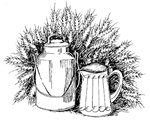THE HEALTH BENEFITS OF BEE PROPOLIS
 Honey Bees collect resins from various trees and other plants and mix them with their saliva to produce a sticky substance called propolis. Bees use the propolis to insulate their hives and prevent invasion of organisms detrimental to the health of the hive. Propolis made from resins collected in the Northern Hemisphere usually contain around fifty different constituents while propolis made in the Southern Hemisphere contain even more constituents due to a wider variety of available resins and a greater variety of bee species making the propolis.
Honey Bees collect resins from various trees and other plants and mix them with their saliva to produce a sticky substance called propolis. Bees use the propolis to insulate their hives and prevent invasion of organisms detrimental to the health of the hive. Propolis made from resins collected in the Northern Hemisphere usually contain around fifty different constituents while propolis made in the Southern Hemisphere contain even more constituents due to a wider variety of available resins and a greater variety of bee species making the propolis.
The constituents that make up bee propolis have been found to have a variety of benefits not only for the health of bees and their hives but also for human health. Propolis has been used medicinally for thousands of years. It is still one of the most frequently used remedies in the Balkan states for treatment of wounds, burns, sore throat, stomach ulcers and a variety of other ailments. Propolis has been found to have antibacterial, antifungal, antiviral, anti-inflammatory and antioxidant effects. Propolis is very rich in bioflavonoids which are substances known to fight inflammation.
Both in-vivo (in the body) and in-vitro (test tube) studies have shown propolis to be effective in the treatment of a variety of health issues. Studies have shown propolis to be helpful in the treatment or the herpes virus that causes cold sores, various bacterial infections, influenza, the common cold and even some cancers.
My first experience with propolis was many years ago when I was playing in a basketball tournament and was experiencing symptoms of the flu. Someone gave me some propolis to ingest and shortly thereafter I was back to playing basketball as the flu symptoms had disappeared.
Most Northern Hemisphere propolis is brown in color. Propolis from the Southern Hemisphere has a wider range of color from brown and green to red. It used to be believed that all propolis had the same chemical makeup. In recent years it has been discovered that there is a significant difference in the chemical composition of propolis depending on the geographical area in which it is found and even the type of bees making the propolis. In other words, all bee propolis is not the same.
Where bees live and what they collect in the way of resins and other substances will determine the chemical makeup of the propolis they produce. In the Northern Hemisphere bees get much of their resin from the buds of poplar trees. Propolis made from this resin will have a certain profile of chemical compounds germane to the resin from poplar trees. In the Southern Hemisphere you don’t have poplar trees so the bees must get their resins from other plants and such resins will have chemical compounds different from poplar trees. For example, propolis from Brazil will have a different chemical makeup from propolis produced in Wisconsin.
Despite the differences in chemical composition of propolis from different areas of the world, research has shown that the basic antifungal, antibacterial, and antiviral activity of propolis is the same regardless of where the propolis came from and offers pretty much the same level of protection to bees and their hives. For example, in testing the antibacterial activity of European, Brazilian and Central American propolis, it was found that propolis from Europe and Brazil had similar antibacterial activity despite significant differences in their overall chemical makeup. However, their antibacterial activity was much greater than Central American propolis which shows there are differences in the potency level of different propolis.
Though all propolis appears to have antibacterial, antifungal, antiviral, anti-inflammatory and antioxidant effects, research has also identified specific chemical compounds in some propolis as opposed to other propolis that have specific therapeutic value for dealing with specific human health problems. I recommend a propolis product from the company EuroPharma (Terry Naturally) called Propolis Extract EP300. This propolis is gathered from countries surrounding the 45th parallel which have a broad range of tree resins from which bees create their propolis. Therefore, this propolis provides a wide range of chemical compounds that the body can use therapeutically.
Propolis Extract EP300 is available at Milk 'N Honey.